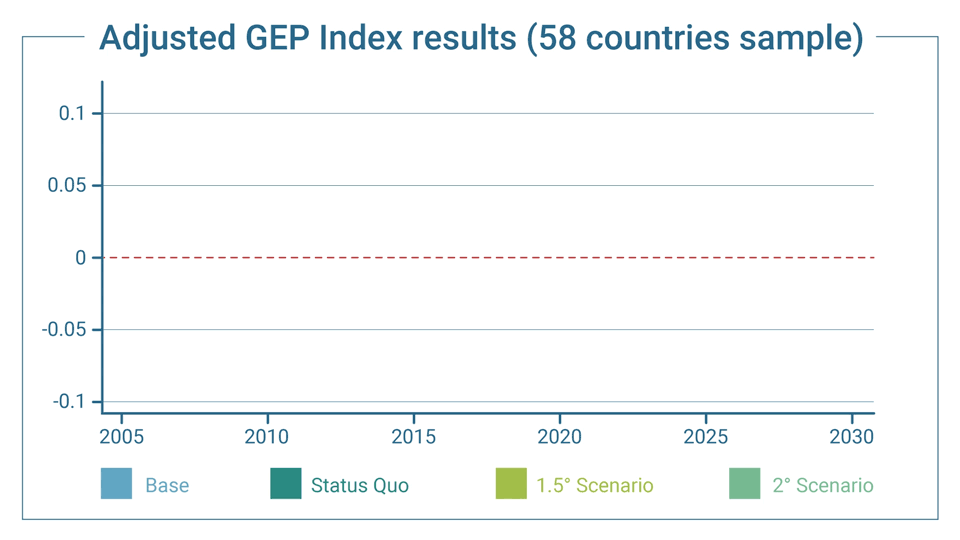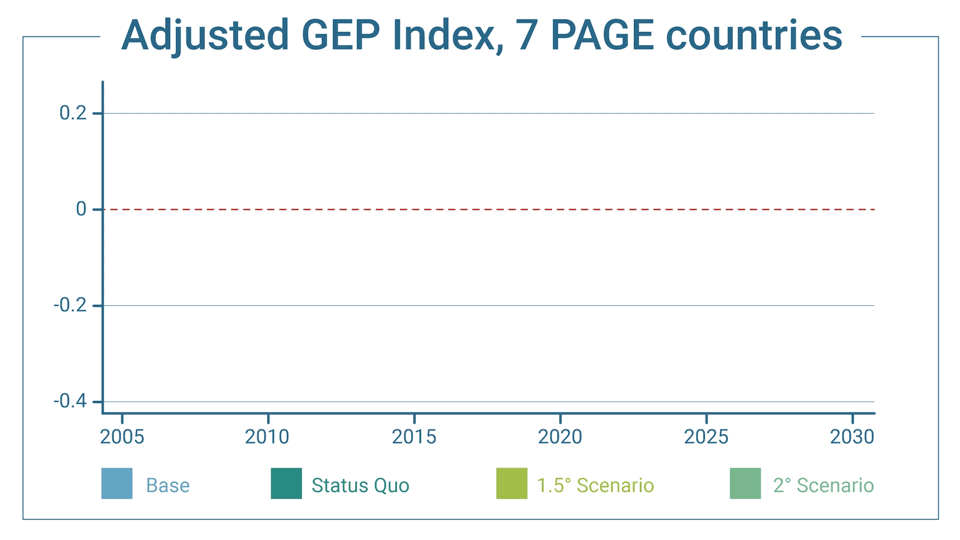Green Economy Progress Measurement Framework
Accelerating the economic transition towards a inclusive and green economy

Table of Contents
Moving beyond GDP is fundamental to building an economic system that gives value to what counts – human well-being – now and in the future, and for everyone. Effectively measuring what counts can help lead the world toward a more just, inclusive and sustainable development path.

An inclusive green economy is one that improves human well-being and builds social equity while reducing environmental risks and scarcities. PAGE supports decision and policymakers to gain understanding on how green economy is progressing in their respective country by means of the Green Economy Progress Measurement Framework.
As the UN Secretary-General Antonio Guterres has pointed out recently, we need to move beyond GDP as the main metrics for making progress. With the GEP framework, PAGE not only helps countries to monitor their progress towards the needed green economic transformation, but it serves also as a powerful analytical tool for identifying priority areas for investments, beyond economic indicators.
Accelerating the recovery through the transition towards climate-neutral economies
The five—year period (2014—2019) that preceded the pandemic was characterized by important improvements in the overall inclusive green economy worldwide, although some sustainability challenges persist.
The recent major shocks to global society have caused a setback in inclusive green economy trajectories. However, massive investments through a “Green Push Scenario” aimed at limiting global warming to 1.5°C can reinvigorate progress in transitioning towards inclusive green economies.
Caution is needed, though, as such a scenario may lead to negative impacts on employment and income inequality if not accompanied by just transition policies.
The Third Edition of the GEP Measurement Framework puts forward three recommended policy actions for advancing an Inclusive Green Economy (IGE), in alignment with the 2030 Agenda for Sustainable Development:
Balancing Inclusive Green Economy Progress: Prioritizing Economic Transformation
Results from the Green Economy Progress Measurement Framework for the pre-COVID-19 period (2014—2019) show that most countries made significant improvements in IGE, particularly in areas like energy use, life expectancy, gender inequality, access to basic services, and education. However, on average, countries regressed in terms of material footprint, nitrogen emissions, and carbon emissions, while showing little progress in renewable energy uptake. While green economy progress made in the former areas should be reinforced, it is crucial to effectuate an economic transformation that delivers positive results in the latter areas, where countries are facing the most significant challenges.
Implementing Carbon-Neutral Policies for a Long-Term Inclusive Green Economy Progress
Results from the “Adjusted GEP Index” (2020—2030) reveal that the COVID-19 pandemic and the War in Ukraine have set back countries’ progress towards an Inclusive Green Economy (IGE). A “Green Push Scenario” aimed at limiting global warming to 1.5°C could serve as a pathway to put countries back on track and deliver a more sustained IGE recovery. However, this scenario would involve certain trade-offs, including slower short-term progress in reducing income inequality, and a moderated growth in labour productivity in the medium-to-long term. This underscores the need for additional policies within the net-zero transition that could improve income inequality in the short term and enhance labour productivity in the medium-to-long-term.
Expanding Investments for Advancing an Inclusive Green Economy
Results from the E3ME modelling underscore that a “Green Push scenario” can positively impact economic growth and drastically reduce CO2 emissions. Indeed, by prioritizing green investments, societies can pave the way for a cleaner and greener future while also reaping the benefits of enhanced economic prosperity. Nevertheless, our findings also indicate that this “Green Push Scenario” may yield inferior employment outcomes compared to the status quo (which involves further pushing fossil fuel consumption), though not significantly different from the baseline scenario. It is therefore essential that green investments are coupled with just transition policies to ensure that the pathway to a more sustainable and low-carbon economy is fair and inclusive, and that it protects workers, promotes social inclusion, and ensures that no one is left behind.

The third edition of the Green Economy Progress Measurement Framework
The Green Economy Progress Measurement Framework in figures




- Globally, compared with the values of the two previous editions, in the period before the COVID-19 pandemic (2014-2019), more than 75 percent of the countries analysed experienced progress towards an inclusive green economy.
- On average, countries progressed in energy use, life expectancy, gender inequality, access to basic services, and education. On the other hand, countries regressed in material footprint, nitrogen emissions, and carbon emissions while showing little progress in renewable energy.
- The IGE Index shows that 14 of the PAGE countries made IGE progress over the period 2014—2019, with Uruguay and Thailand heading the list.
- The recent major shocks to global society have caused a setback in inclusive green economy trajectories. However, massive investments through a “Green Push Scenario” aimed at limiting global warming to 1.5°C can reinvigorate progress in transitioning towards inclusive green economies.
- For most of the 7 PAGE countries (analysed in the modelling exercise), the only valid option for a sustained IGE transition is the 1.5°C scenario.

Previous editions and country applications
 pdf
pdfGreen Economy Progress Measurement Framework Methodology
2017 pdf
pdfGreen Economy Progress Measurement Framework Application
2017 pdf
pdfGreen Economy Progress Measurement Framework Application – Second Edition
2021 pdf
pdfSouth Africa Green Economy Progress Measurement Framework
2020 pdf
pdfJiangsu and Fujian Province Green Economy Progress Measurement (2015-2017)
2020 pdf
pdfIndonesia Green Economy Index
2022
